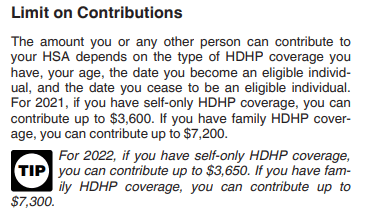Let's Get Started
You'll get the most value from financial planning if your specific goals and needs match a firm's philosophy and services. Let's learn more about each other.
Ready to Get Started?


Just once in your lifetime you are allowed to roll money from your IRA to your HSA, or health savings account. This IRA to HSA rollover is called a “qualified HSA funding distribution”.
This move can help you reduce your tax liability and let you tap retirement funds early. But there’s a few things you should know before you make the transfer:
First, you must be currently eligible to contribute to an HSA to make the rollover from your IRA.
If you are not currently covered by a high deductible health plan, you can not do a rollover to your HSA from your IRA. In addition to being eligible right now to contribute to an HSA, you must remain in an HSA eligible health insurance plan for at least 12 months after making the HSA funding distribution.
If you switch part way through this 12 month testing period, you will be subject to additional taxes and penalties.
The rollover amount you are able to do is capped at the annual contribution limit for your HSA.
This amount varies depending on if you are on an individual or family plan and increases each year with inflation. IRS publication 969 will have the up to date numbers.

And, this rollover amount counts as your contribution. You can not contribute the max amount to your health savings account and then also rollover an additional amount in the same year.
Why should you utilize this opportunity to move money from an IRA to an HSA?
First of all, it will reduce your tax liability. Whenever you go to withdrawal money from an IRA it will be taxed like income. An HSA on the other hand is not taxed if used for qualified medical expenses.
And one thing we know is that medical care in retirement is expensive. You won’t have a problem finding a qualified expense.
HSAs are also not subject to RMDs, or required minimum distributions like IRAs are. This means that if you don’t have expenses, you can let the assets remain in the HSA and continue to grow and compound tax free.
This rollover also allows you to access retirement funds before age 59 and a half.
If you withdrawal from an IRA before age 59.5, you will be subject to not only taxes but also a penalty. If you have qualified expenses, you can withdrawal money from an HSA at any time.
So, this rollover can be especially beneficial to early retirees or those with large medical bills before age 59.5.
In general we see HSAs as one of the most valuable types of accounts to have in retirement after age 65, and taking advantage of this once in a lifetime opportunity to transfer assets from an IRA to an HSA is something that most who are able to, should take advantage of.
Matt worked for the Department of Defense as a material scientist before changing careers to follow his interests in personal finance and investing. Matt has been quoted in The Wall Street Journal, CNBC, Kiplinger, and other nationally recognized finance publications as a flat fee advisor for Arnold and Mote Wealth Management. He lives in North Liberty, where you will likely find him, his wife Jessica, and two kids walking their dog on a nice day. In his free time Matt is an avid reader, and is probably planning his next family vacation.